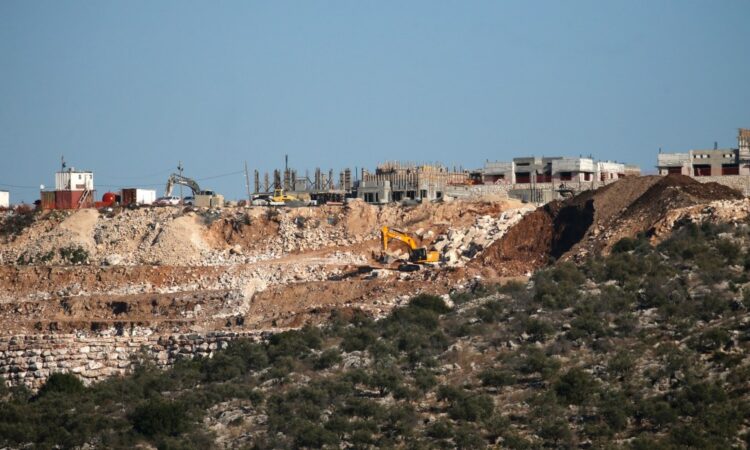
The U.S. military’s recent $35 million contract to do construction at its secret base in Israel went to a joint venture that includes an American firm and an Israeli one. The Israeli company, Y.D. Ashush Infrastructure, has been involved in many large-scale infrastructure and public works projects — including building an illegal settlement in occupied Palestinian territory.
In a section on its website touting its projects, Ashush mentions construction work in the settlement of Leshem. Originally planned to include nearly 700 homes, Leshem was constructed in the 2010s as a satellite of Alei Zahav, a settlement established in 1982.
“I estimate that Leshem has tripled the number of settlers in Alei Zahav.”
“Leshem is an Israeli settlement that was established in 2010, officially as a ‘neighborhood’ of an older settlement called Alei Zahav,” Dror Etkes — founder of Kerem Navot, an Israeli organization that monitors Israeli land policy in the West Bank — told The Intercept. Etkes said describing new communities as “neighborhoods” was a “trick” used by settlers to make it look like no new settlement was being constructed, since such moves have often drawn international condemnation.
“De facto it’s an independent settlement,” Etkes explained. “I estimate that Leshem has tripled the number of settlers in Alei Zahav.” Data from B’Tselem, a human rights group, shows the population of Alei Zahav growing from around 1,000 people in 2014 to about 4,700 in 2022. Etkes also said Leshem expanded the geographical footprint of Alei Zahav by three or four times.
Ashush’s website describes its work in Leshem as involving extensive earthworks, including controlled explosions, along with infrastructure work for new construction.
Neither Ashush nor the Defense Department responded to requests for comment about the contract and Ashush’s settlement work.
Leshem has been in the news in recent years for hostility to its neighboring Palestinian villages. In 2020, the settlement was accused of deliberately dumping its sewage into the farmlands of nearby Deir Ballut, preventing its olive harvest and destroying trees, some of which date back to Roman times.

The Israeli settlement of Leshem is seen near the Palestinian archeological fort of Deir Samaan on Jan. 23, 2017.
Considered illegal under international law and by nearly every country in the world apart from the U.S. and Israel, settlements have continued to grow even as international opinion tilts strongly against them. An occupying military force like Israel transferring civilian populations into occupied territory such as the West Bank is a war crime under the Fourth Geneva Convention.
In the case of Palestine, major settlement blocs as well as so-called outposts — those settlements considered illegal even by Israeli law, many of which are eventually legalized — create “facts on the ground” as part of a strategy to make a contiguous Palestinian state impossible.
U.S. administrations have frequently opposed and even taken rare action against Israel for continued settlement construction — an irony of the Pentagon giving cash to a construction firm that profits off the settlement enterprise.
Ashush Infrastructure
Ashush is a major Israeli construction firm that builds everything from concrete shields on houses in Israel’s south, near Gaza, to military and intelligence installations. As in its West Bank projects, Ashush does massive public works and earthmoving projects all across the country.
The company was referenced in the Pentagon’s August 2 contract announcement for the construction of a “life-support area” in Israel. Other documents revealed this to be a euphemism for the construction of barracks-like facilities to house U.S. military personnel on its unacknowledged base deep in the Negev desert, code-named “Site 512,” as The Intercept reported. Four other bids were considered, according to the Defense Department’s contract announcement.
It is not clear how much of the $35 million joint venture contract, shared with the Colorado construction company Bryan Construction, went to Ashush. Bryan Construction did not respond to requests for comment. Ashush does not appear in public databases that track U.S. government contracts, meaning there is no transparency around how much public money is flowing to the company.
Ashush’s website describes the firm as the main contractor in “extensive” infrastructure and development work in Leshem from 2014 to 2018. The work, its site says, was commissioned by the Samaria Regional Council, which oversees 35 different settlements and a population of about 47,000 settlers in the northern part of the West Bank. (Settlers and many other Israelis refer to the West Bank by the name “Judea and Samaria,” for the ancient regions it covers.)
In 2015, when U.S. diplomats investigated allegations of vandalism, including the uprooting of thousands of Palestinian-owned olive trees in the West Bank by settlers from an Israeli “outpost,” the settlers assaulted them with stones. Though the State Department confirmed the incident and provided a video to Israeli authorities, the controversial head of the Samaria Regional Council Yossi Dagan, an ally of Israeli Prime Minister Benjamin Netanyahu, called for the diplomats’ expulsion, accusing them of being spies.
“The land which the settlement is sitting on was looted by the Israeli government from two Palestinian communities.”
A report from January 2022 described settlers from Alei Zahav destroying a Palestinian farmer’s olive trees with assistance from the Israeli military. The military, at the behest of the settlers, ordered the farmer off the land and seized a tractor, claiming that the land was owned by the Israeli state.
“The land which the settlement is sitting on was looted by the Israeli government from two Palestinian communities … in the 1980s by declaring it as ‘state land,’ which was allocated to Alei Zahav later,” said Etkes, the Israeli expert on settlements.
Months later, in July, another report described settlers destroying another nearby farm.
